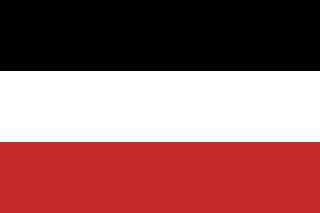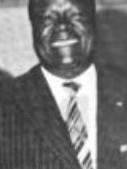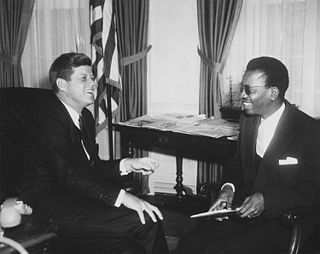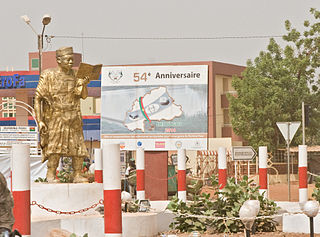Related Research Articles

The Republic of Upper Volta was a landlocked West African country established on 11 December 1958 as a self-governing state within the French Community. Before becoming autonomous,it had been part of the French Union as the French Upper Volta. On 5 August 1960,it gained full independence from France. On 4 August 1984,it changed its name to Burkina Faso.

French West Africa was a federation of eight French colonial territories in West Africa:Mauritania,Senegal,French Sudan,French Guinea,Ivory Coast,Upper Volta,Dahomey and Niger. The federation existed from 1895 until 1958. Its capital was Saint-Louis,Senegal until 1902,and then Dakar until the federation's collapse in 1960.

Maurice Nawalagmba Yaméogo was the first President of the Republic of Upper Volta,now called Burkina Faso,from 1959 until 1966.
Gilbert Noël Ouédraogo is a Burkinabépolitician who has been President of the Alliance for Democracy and Federation–African Democratic Rally (ADF-RDA),a political party in Burkina Faso,since 2003. He served in the government of Burkina Faso as Minister of Social Action and National Solidarity from 2000 to 2002 and as Minister of Transport from 2006 to 2013. He was the Fourth Vice-President of the National Assembly of Burkina Faso from 2013 to 2014.

Gérard Kango Ouédraogo was a Burkinabéstatesman and diplomat who served as Prime Minister of Upper Volta from 13 February 1971 to 8 February 1974. He was subsequently President of the National Assembly of Upper Volta from October 1978 to November 25,1980.

Frédéric Fernand Guirma is a diplomat,writer and politician from Burkina Faso. In 1959 he became the president of the trade union centre CATC. From 1960 to 1963 he was the Republic of Upper Volta's first Ambassador to the United States. He was also Permanent Representative to the United Nations. He heads the conservative political party Front de Refus or RDA. He gained 5.87% of the vote in the 1998 presidential election.

Upper Volta was a colony of French West Africa established in 1919 in the territory occupied by present-day Burkina Faso. It was formed from territories that had been part of the colonies of Upper Senegal and Niger and the Côte d'Ivoire. The colony was dissolved on 5 September 1932,with parts being administered by the Côte d'Ivoire,French Sudan and the Colony of Niger.

Nazi Boni was a politician from Upper Volta. In 1948 Boni was elected to the French National Assembly on behalf of the Voltaic Union (UV),and was re-elected in 1951 running on the Economic and Social Action in the Interests of Upper Volta list,although he remained a UV member. In 1955 Boni founded the African Popular Movement (MPA) after a split from the UV. In January 1957,Boni's MPA took part in the founding of the African Convention,a pan-African party that later merged into the African Regroupment Party.
Joseph Ouédraogo was a Burkinabètrade unionist and politician,active during the last years of the French Upper Volta and subsequently in the Republic of Upper Volta.

Territorial Assembly elections were held in French Upper Volta on 30 May 1948,with a second round on 20 June. They were the first elections to the new Territorial Assembly,which had been created following the separation of Upper Volta from Ivory Coast the previous year.

Territorial Assembly elections were held in French Upper Volta on 30 March 1952. The result was a victory for the Voltaic Union (UV).
Makoukou Célestine Ouezzin Coulibaly-Traoré,née Macoucou Traoré,was an anti-colonial leader in French West Africa. She helped to set up the women's section of the Rassemblement Démocratique Africain in Côte d'Ivoire and Upper Volta,becoming its secretary general in 1948. In 1958,she was appointed Upper Volta's Minister of Social Affairs,probably making her the first woman to join a cabinet in any of the French-speaking West African governments.

The Burkina Faso–Niger border is 622 km in length and runs from the tripoint with Mali in the north to the tripoint with Benin in the south.

The Burkina Faso–Mali border is 1,325 km in length and runs from the tripoint with Ivory Coast in the west to the tripoint with Niger in the east.

The Burkina Faso–Ivory Coast border is 545 km in length and runs from the tripoint with Mali in the west to the tripoint with Ghana in the east.

The Burkina Faso–Togo border is 131 km in length and runs from the tripoint with Ghana in the west to the tripoint with Benin in the east.